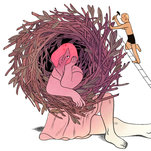It’s been a tough week. Let’s take a break and discuss the catfish inspection program.
Op-Ed Columnist
Missing the Bad Old Days
By GAIL COLLINS
Published: November 8, 2013

Earl Wilson/The New York Times
Gail Collins
Connect With Us on Twitter
For Op-Ed, follow @nytopinion and to hear from the editorial page editor, Andrew Rosenthal, follow @andyrNYT.
There was a time when I had no strong feelings about this subject, but that was before the 2012 election, when we learned that Representative Paul Ryan’s favorite sport was “noodling,” which involves walking along the river and grabbing catfish by their throats. “You get your hand inside the fish, so they kind of, they come up on your hand,” the soon-to-be-vice-presidential candidate told The Times. “Then you just squeeze wherever you are on that fish and pull it out. I know it sounds a little crazy, but it’s really exhilarating.”
Don’t you miss that election? Back then, we had Mitt Romney’s dog on the car roof. Now we have Barack Obama’s website on the fritz.
Anyway, catfish have seemed a lot more interesting since then. And they’re currently a big issue in Congress, where the House and Senate are trying to put together a joint farm bill. It is very important that they get this done, because otherwise, at the end of the year, the country will revert to Depression-era agriculture laws and we all fall over the dairy cliff. I am not saying another word about this because I know you’re suffering from cliff fatigue. Just don’t plan for any events in early 2014 that involve purchasing a lot of ice cream.
One of the differences between the House and Senate versions of the farm bill involves a special catfish inspection office in the Agriculture Department, which Congress created in 2008. The office, which is supposed to check imported catfish to make sure they’re safe to eat, has yet to start up, although it’s already cost us $20 million.
Meanwhile, the Food and Drug Administration has been inspecting the catfish, as it does with all imported seafood. The F.D.A. catfish inspections cost about $700,000 a year. The Department of Agriculture plans to spend about $14 million.
The House wants to get rid of the office. The Senate wants to keep it, under the theory that tougher inspections mean safer catfish. But, honestly, if that was the real reason, don’t you think the Senate would be insisting that other seafood get the Department of Agriculture treatment, too? Shrimp lovers, unite!
(The catfish industry and its supporters say catfish are different because they’re raised on farms rather than harvested from open waters. Unless, of course, you go out and grab one by the throat.)
“We know this isn’t about food safety. It’s about helping the catfish industry in Mississippi and other states in the South,” said Senator Jeanne Shaheen of New Hampshire. Shaheen, a Democrat, has been allied with Republican John McCain in a crusade against the new inspection office.
“This is the kind of program that makes the public cynical about government,” she said.
Shaheen and McCain failed utterly in their attempts to amend the Senate farm bill to get rid of the dueling catfish inspections. This is perhaps because the Senate leadership has refused to allow a vote on the matter. We have no official word on why, but all eyes have wandered in the direction of Senator Thad Cochran of Mississippi, the senior Republican on the Senate agriculture committee. A state where catfish are so important that Mississippi State has a research facility to study them. Which is named the Thad Cochran National Warmwater Aquaculture Center.
See, this is what I like about the farm bill. The agriculture parts harken back to the golden era when Republicans and Democrats could work together to promote stupid ideas that benefited the special interests in their districts. And then go out and get inebriated in bipartisan drinking sessions. Now everybody is in the gym and then shutting down the government.
Or trying to eliminate food stamps. By far the biggest argument between the House and Senate on the farm bill is about the food stamp program, which the House Republicans want to slash by $39 billion, mainly through new screening programs to guarantee that every single recipient is working, drug-free, needy and in general totally and completely worthy of government assistance. Even if that means inadvertently emptying a lot of deserving cupboards along the way.
This would be in the same bill that includes crop insurance subsidies that make no attempt whatsoever to screen out the undeserving rich. “Some of them are guys who farm in four or five states, in 20 different counties, growing five or six different crops. These are some of the most successful businesses in the country,” said Scott Faber of the Environmental Working Group, which recently released a report on the number of billionaires who received farm subsidies since 1995 (about 50).
There was a time when we dreamed about a Congress in which the members voted on principle. Did not imagine the principle would involve figuring out new ways to funnel more federal money to the people who need it least.










